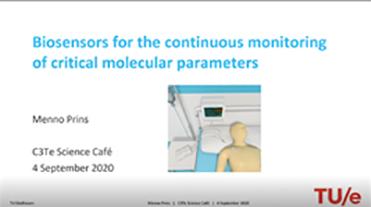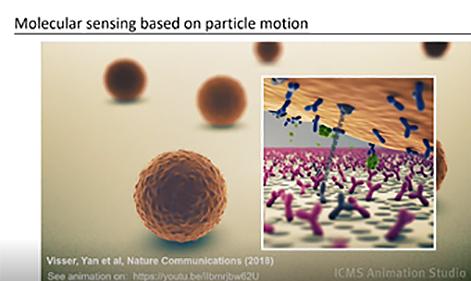On September 4th 2020, the Center for Care & Cure Technology Eindhoven (C3Te) organized their first Care & Cure Science Café webinar of the new academic year. Prof. Menno Prins is featuring this webinar. Prof. Prins studied Applied Physics at Delft University and in Paris, where he obtained his master degree cum laude. He received his PhD from Radboud University Nijmegen within Physics, where he probably remembers performing experiments in “Het UL”, the universal laboratory on the Heyendaalseweg. After his PhD, Prof. Prins moved to Philips Research where he worked on microfluidics and point-of-care biosensing. In 2005, he was appointed as part-time Professor at the TU/e in the department of Applied Physics. In 2014, Prof. Prins became full professor in Molecular Biosensing for Medical Diagnostics in departments of both Biomedical Engineering as well as Applied Physics. Prof. Menno Prins is an expert on the development of technologies to detect molecules, but how is the knowledge of the audience of today’s webinar on molecules?! The small Pub Quiz revealed that Ellen van Wesel (dep. EE, EM group) has the most knowledge on molecules.

Today Prof. Menno Prins will talk about his recently awarded Innovative Training Network Action “Consense – A game change in continuous biosensing: Molecularly engineered affinity-based nanoswitches for personal monitoring”. Prof. Menno Prins starts off with explaining in more detail the Consense consortium and that the TU/e will have a large role in the optical biosensing part. Afterwards he dives into the field of biochemical testing. Continuous biochemical measurements on or in the body are of interest, preferable via a minimally invasive fashion. Present commercial sensors for continuous monitoring are the continuous glucose monitors (CGM). Electrochemical detection using enzymes where the charge is channeled via redox mediators to an electrode and the current signal is translated into a glucose value. For continuous biomechemical monitoring there is a need for a generic technology that can address a wide range of molecules at a wide range of concentrations and the system needs to be automatic, reversible, robust and cost effective. This is a technological challenge that we would like to tackle within Consense

Within the MBx group at TU/e they perform research in the area of Biosensing with single-molecule resolution using nanoparticles. Nanoparticles are used since they give big optical signals and single-molecule resolution is the next step in biosensing to go from analogue to digital. Molecular sensing based on particle motion is one of the technologies that MBx uses for continuous biomarker monitoring. Prof. Menno explains how this molecular sensing based on particle motion works and how motion patterns are used for sensitivity, specificity, precision, accuracy and robustness of the digital signal of the sensor.
Prof. Prins continues with a new variant which allows for very detailed control of the sensor, the BPM (biosensing by particle mobility) sensor with single stem probe. This sensor can scale the sensitivity range. He continuous with the competition assay for detection of molecules with a response time of less than 3 min. In all described assays the outcomes are digital data which are processed for improving sensitivity and precision.
To close this Care and Cure Science Café webinar, Prof. Menno Prins emphasizes that biosensing not only has applications in patient care, also in the food industry and for bioreactor/fermenters there are application possibilities. Continuous monitoring as technological solution can provide automatic monitoring of process-critical molecules. It can generate a high data rate with low costs per data point for closed-loop control, which can reduce both costs and failure rates. The application value of continuous biomolecular monitoring will be a tailored product with high quality at minimal costs with optimal use of resources.